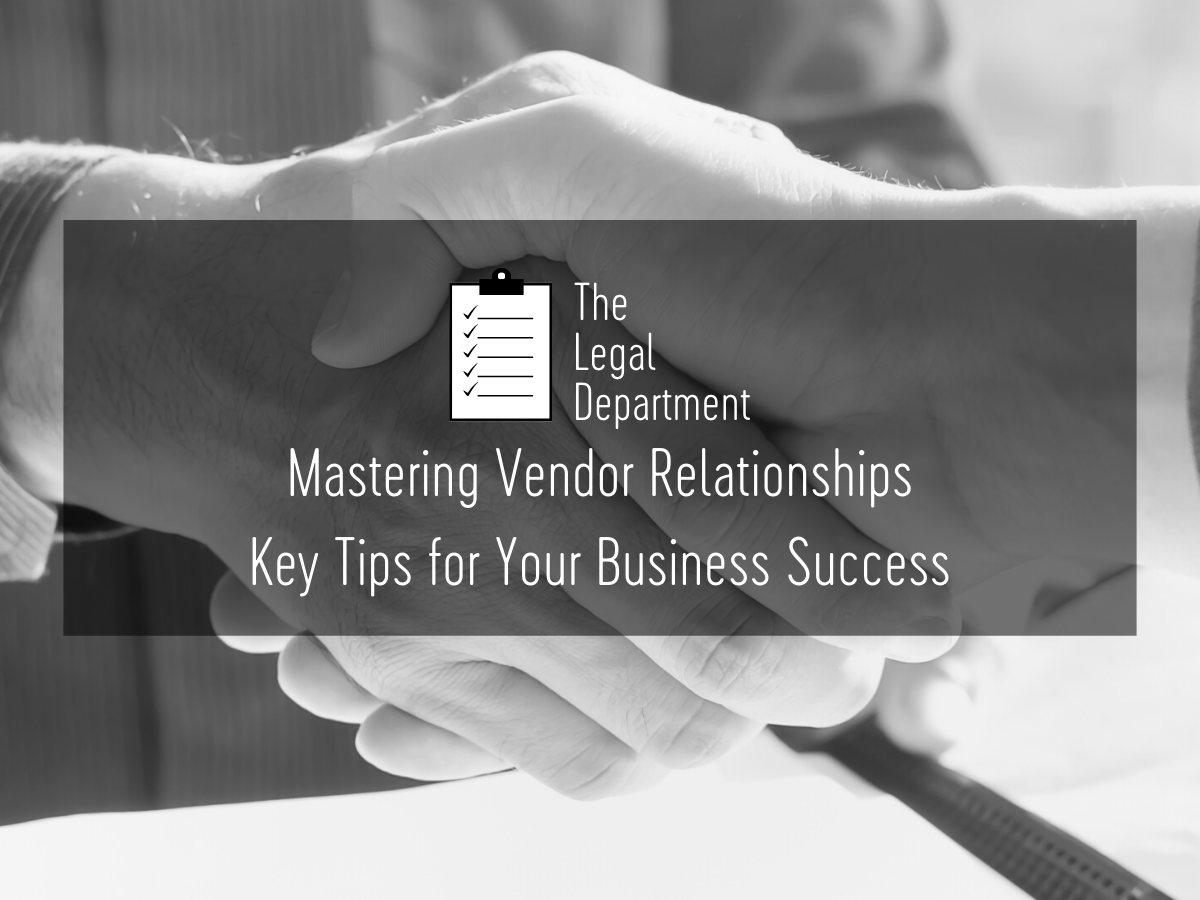Vendor Agreements
This area of infrastructure deals with relationships with your vendors – those businesses who provide your business with products or services. You are their client.
You may hire a vendor for several reasons: phone service, office supply delivery, shredding confidential documents, marketing, website design and maintenance, office cleaning, IT management, accounting, bookkeeping, cleaning, promotional products, software subscriptions, and so many others.
All of these relationships are important to the functioning of your business. If one relationship should go wrong and a conflict emerges, it could take valuable resources (in time, money, and attention) away from your business. So it’s important to establish a good relationship from the beginning – and that relationship is often represented in the form of a written contract.
All of these relationships are important to the functioning of your business. If one relationship should go wrong and a conflict emerges, it could take valuable resources (in time, money, and attention) away from your business. So it’s important to establish a good relationship from the beginning – and that relationship is often represented in the form of a written contract.
All of these relationships are important to the functioning of your business. If one relationship should go wrong and a conflict emerges, it could take valuable resources (in time, money, and attention) away from your business. So it’s important to establish a good relationship from the beginning – and that relationship is often represented in the form of a written contract.
Frequently Asked Questions
Why should I want a written contract with my vendor?
You are hiring them to provide you with a product or service, so you should understand exactly what that is going to be. Often contracts can help eliminate misunderstandings – when one party thinks one thing and the other party understands something completely different. This is often the case when people do things “by handshake” because they haven’t gone through the process of flushing out the details. A written contract is a good thing.
Do I provide my vendors with a contract?
Usually not. Usually, vendors have their own contracts since they are the ones who are providing their services or products on a regular basis. They would present their contract to you for review and acceptance.
What if my vendor provides me with a contract I don’t like?
Just because a vendor gives you a contract to sign doesn’t mean you have to sign it as-is. Don’t be shy! Have a conversation with the vendor and tell them your concerns. Ask if the contract can be modified to make you more comfortable. If they say yes, make sure the contract actually gets modified before you sign it (you’d be surprised…). If they say no, then you need to make a decision on how much you want to work with this particular vendor and what you are willing to accept to do so.
What if I’ve already signed the vendor contract and a problem arises?
Then that is a problem. If you’ve signed, then there’s not much to do other than negotiate a way out of the predicament. If you can’t negotiate your way through, then you have two choices: stick it out or start a fight. Neither choice is good for business – one leaves you paying for something you don’t want and the other leaves you paying (in time and/or money) to get yourself out of it. The best solution? Read the contract and negotiate it before you sign it. And get help from an experienced business attorney if you think you need it.
What if I don’t understand a vendor’s contract?
That usually just means it wasn’t well written. Go to the vendor and tell them that you don’t understand a part of the contract and ask them to explain. Make sure you understand their explanation – and if it makes you feel more comfortable, ask them to explain it better in the contract. It’s always possible to add language to make the intention more clear. Don’t sign until you understand and are comfortable.
Focus on these specific areas in your business to build stronger legal infrastructure:
Entity Structure
The type, organization, structure, and governance of your business is the most basic aspect of your foundation.
Regulatory Compliance
Many service professionals are governed by specialized rules and regulations in addition to general regulations.
Client Relationships
Having direct, honest relationships with your clients is the key to repeat business, referrals, and long-term success.
Vendor Relationships
When you’re the client, understanding the agreement and how the relationship should work is critical.
Worker Relationships
Relationships with an employee or independent contractor need to be defined to protect your business and clients.
Owner Relationships
Without structure or guidelines to establish expectations and accountability, business partners can pose a high risk.
Trademarks
An important part of protecting your brand is making sure your trademark rights are in place.
Copyrights
Copyrights capture a broad range of things you create for your business or for your clients.
Check out our journal posts below for more information on this topic:
Here’s what our clients are saying:
“They held our hands throughout the process and were always available to assist whenever we had any concerns. The level of personal care we received spoke volumes about this firm. ”
“I can honestly say I could not have ended up in better hands. Laurie has always been very attentive, an excellent listener, and continues to ask all of the right questions so that she can advise me on the best options for my situation at the time.”
“Laurie helped us during the initial steps of setting up our corporation and with our lease review process. It is good to have someone to turn to that knows all the bases you need to cover. She is always attentive and available and demonstrates true regards toward your business.”









